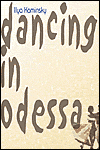~PATRICIA FARGNOLI~
ILYA
KAMINSKY: DANCING IN ODESSA
There are poems here, many of them, that
are almost
unbearable
in their beauty, places in the book where I can't bear to
read longer
because I want to stall in the moment the words have
given me,
to put down the book, to rest in the strength of the
words.
Once in a rare while, if you are terribly
lucky, you read a poet whose poems are so numinous, so
breathtaking, whose rhythms are so full of music that you wish
they could enter your body, could breathe with the lift and fall of
your own breath — whose images, no matter how foreign to your own
experience, enter your mind and are fixed there, changing forever your
perception of the world. Ilya Kaminsky is such a poet and his
first book, Dancing in Odessa,
bursts with such poems.
Kaminsky, deaf since he was four, was born in
Odessa, in the former
Soviet Union in 1977. He emigrated to the United States in 1993.
That he is still very young, writing in a language that is not his soul
language, a language whose rhythms he cannot hear, makes this work all
the more wondrous.
is not his soul
language, a language whose rhythms he cannot hear, makes this work all
the more wondrous.
And how does he construct this magic? Dancing in Odessa is composed of
five sections of free verse and prose poems: memories of the poet's
youth in Russia; a long elegiac sequence to the poet Osip Mandelstam
who died in a Russian prison; love poems to a woman he names
"Natalie"; a sequence of poems to his "masters" . . . those forebears
that
serve as his mentors; and a final long sequence aptly entitled:
"Praise."
But a simple description of the book's tight
cohesive structure hardly
does justice to the poems themselves. Here are fragments of
memory: the
Odessa of his youth . . . laundry in the windows, street musicians,
doves
and crows, the mother, the father, dancing as "the darkness
speaks behind them," the aunt "in a soldier’s uniform, in wooden
shoes," the grandfather "running after a train with tomatoes in his
coat." And here, too, is the love who "dances without a
shirt, covering what she could"; "whom he kisses / on the floor, among
the peels of lemon"; for whose sake he can exclaim, "how magical it is
to live!" (and we, reading this, nod, knowing it to be true!).
And here, also, is homage to Osip, the
martyred poet who "puts his
fingers in the fire," to Celan, to Brodsky, to Tsvetaeva, to
Babel, a farewell to them each — and gratitude for their
legacy: "I write," he says of them, "as the pages turn / to the
shuffle of your steps across the room."
And here are poems of metaphors so original,
so sensuous and accurate
that they seem to leap off the page: "memory" is "an old
flautist, / [who] plays in the rain . . . "; "time" is the
"twin" who takes him "by the hand through the streets of [its]
city"; the "past" is "figures coming to the water's edge,
carrying lamps"; love itself is "a one-legged bird" bought "for forty
cents as a child."
These are poems of dancing in spite of the
darkness behind us; of
bright fruit, oranges, apples, lemons, tomatoes, nurturing the
spirit. In these poems, "to live" is the sacrament, the most
important thing, the need above all needs. "Lord," he cries out,
"Give us what you have already given."
I have nothing but praise for Dancing in
Odessa. This book
touches what is most deep in me — the urgency of these words, their
forward rolling, makes me want to go
write my own, no, more than that — makes me want to change the
way I live. There are poems here, many of them, that are almost
unbearable in their beauty, places in the book where I can't bear to
read longer because I want to stall in the moment the words have
given me, to put down the book, to rest in the strength of the
words. Words such as these:
This is how we live on earth, a flock of sparrows.
The darkness, a
magician, finds quarters
behind our ears. We don’t know what life is,
who makes it,
the reality is thick
with longing. We put it up to our lips
and drink.
When you pick up this book, you will read straight through, then
read it again. You will keep it on your night-table for those
moments when you need something to cherish, something to hold on to,
words that face the darkness, unflinching, that give you solace in this
troubling world.
Kaminsky, Ilya. Dancing
in Odessa. Dorset, VT: Tupelo Press, 2004. ISBN:
1932195122, $16.95
© by Patricia
Fargnoli



![]()
![]()
![]()
![]()